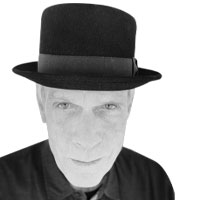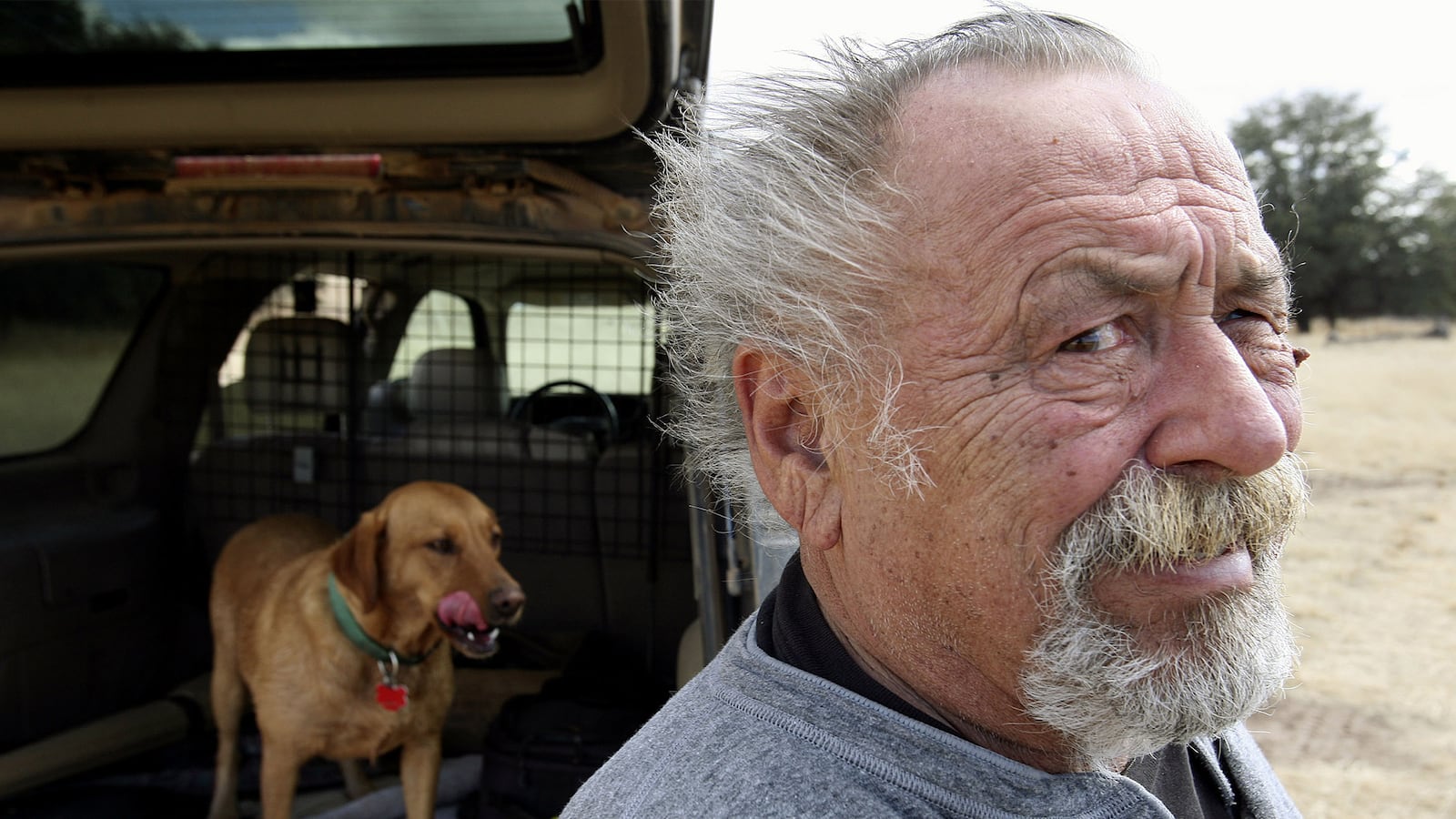A friend and I were talking the other day when the conversation ran up against a maddening mystery: How is it possible that a smallish army of discerning readers agree that Jim Harrison is one of the few truly great living American writers, yet he has not gotten the wider audience—or the widespread praise—he so plainly deserves?
The question is especially timely because Harrison has just come out with a new novel, The Big Seven, which reprises his “retired careworn cop,” Simon Sunderson, who just wants to go trout fishing in Michigan’s Upper Peninsula but runs into a clan of inbred homicidal hellions. It’s Harrison’s 36th book, which means that his impossibly varied yet impossibly consistent output—novels, novellas, short stories, poems, reportage, memoir, and some wicked writing about food—now occupies roughly one yard of shelf space. Why isn’t this man regarded as a national treasure?
My friend and I came up with a few theories:
1.) Harrison’s writing is too violent and it’s too much like Hemingway’s.
This is too obvious and too facile. Yes, Harrison and Hemingway were both formed by the woods and rivers of northern Michigan, and yes, they both developed lean, muscular, masculine prose styles. Blood tends to flow in their books. But Harrison’s violence is never gratuitous, and he’s never guilty of Hemingway’s posturing. One interviewer described Harrison as “a man’s man” and “a slightly grizzled Hemingway-esque character.” That word character implies that Harrison, known for his Falstaffian appetites, is putting on an act. He is not. He is serious about the important things—love and violence, eating and drinking, fishing and fucking, the troubles that dwell in the human heart and, above all, writing well about it. Harrison even went so far as to dismiss Hemingway’s work as “a woodstove that didn’t give off much heat.” That may be too harsh, but there’s no disputing that Harrison and Hemingway are very different writers. Harrison, in my opinion, is by far the better of the two—more versatile, more amazed by life, more generous to his characters, and much funnier. As his hero has it in The Big Seven, “Sunderson always thought Hemingway wrote very well but if you peeked under the covers you saw one of the worst pricks in the history of literature.”
2.) Harrison doesn’t write well about women.
This would indeed be fatal, since most fiction is read by women. But it’s not true. Some of Harrison’s finest writing is told from a woman’s point of view, including the novellas Julip and The Woman Lit By Fireflies, and the novel Dalva, the story of a woman who sets out to reconnect with the child she gave up for adoption when she was an unwed teenager. Few men write women better.
3.) Harrison eats and drinks too much, and he looks weird.
There is some truth to this one. Harrison’s characters are frequently drunk, or trying to be, or fighting not to be. In The Big Seven, Sunderson consumes an entire tuna casserole in one scene, then downs a gallon of red wine in another. Harrison himself once ate a 37-course lunch and lived to write about it. To his credit the man is not a food snob, and his writing on food, collected in The Raw and the Cooked: Confessions of a Roving Gourmand, attests to his voracious appetites and catholic tastes. As for his appearance, the one time I saw him in person, at a reading in New York, he looked less like a literary lion than a hard-used dockworker, thick through the shoulders and chest, his face battered and tallowy, his dead left eye (the result of a childhood accident) prone to wandering. In other words, the man is no pretty boy in a league with Michael Chabon, or even Jonathan Franzen. So what?

4.) Harrison is linked in too many minds with the bad movies that have been made from some of his best books.
On the face of it, this makes some sense. Things got off to a dreary start with the 1990 release of Revenge, based on one of Harrison’s finest novellas, a form at which he has no equal. While the book is taut and brutal, the story of a love triangle gone horribly wrong, the movie is an exercise in empty style, starring Anthony Quinn and a preening Kevin Costner. Things didn’t improve four years later when the title novella from the same 1979 collection, Legends of the Fall, was made into a movie starring Brad Pitt and Aidan Quinn as two rival brothers who leave the family ranch in Montana to fight in World War I, to the dismay of their father, played by Anthony Hopkins. The book is a miniature epic, but what winds up on the screen is a gassy melodramatic fiasco. One critic dubbed it, not unfairly, “Bonanza without a Chinese houseboy.”
Things looked up with 1994’s Wolf, based on Harrison’s satirical first novel and featuring a superb performance by Jack Nicholson, as a book editor who gets bitten by a wolf and develops heightened senses (and hair). It was followed by a pair of passable efforts—Carried Away, based on Harrison’s novel Farmer and impressively free of Hollywood clichés, and a TV movie based on Dalva.
The quality of these movies is uneven at best, but I reject the notion that this accounts for Harrison’s failure to win the wider readership he deserves. Consider Elmore Leonard, whose work has been made into some truly wretched movies. In fact, Leonard’s The Big Bounce got massacred by Hollywood twice. After watching the 1969 version, starring a balsa-wood Ryan O’Neal, Leonard sniffed that it was “the second worst movie ever made.” Yet such bombs have not damaged Leonard’s book sales or critical standing. Bad movies can do only so much harm to good writers.
So none of these theories resolves the maddening mystery. I think Harrison himself came much closer in a 1988 Paris Review interview, when he remarked that the characters he writes about—unhinged veterans, misguided environmentalists, unwed mothers, fighter pilots, Native Americans, cops, drunks, working stiffs, brawlers and killers, usually operating far from America’s coasts—fail to resonate with most New York book editors and reviewers, who, in Harrison’s opinion, dwell in an insular incestuous little nest. “It’s occurred to me,” he said, “that some of the awkwardness I have in reception… is because the kind of people I write about are utterly alien to everyone in the reviewing media.”
True, but it doesn’t go far enough. Not one of Harrison’s three dozen books—astonishing for their consistently high quality and the range of their subject matter and form—was written with an eye toward current literary fashions or fads. He may be one of the most mule-headed and politically incorrect writers at work today (and I say that as high praise) because, quite simply, he has always written what he wanted to write, the way he wanted to write it, New York be damned. While such an approach might give a writer a shot at greatness, it’s unlikely to make him a star in 21st century America.
It would be wrong to suggest that Harrison, now 77, has spent his long career toiling in abject obscurity. He has his dedicated fans, and he was inducted into the American Academy of Arts & Letters in 2007. He’s hardly a nobody. But like so many American writers, artists and musicians, he is more richly appreciated overseas, where he has been translated into some two dozen languages and in 2012 was named Officier des Arts et Lettres by the French Ministry of Culture. At home, his reception remains awkward, and inadequate.
So what’s the solution? It’s simple. Read Jim Harrison. Pick up any of his books and just start reading. His later stuff, including The Big Seven, has gotten a bit drifty and shaggy (he is famously averse to being edited, but this book could have benefited from a rigorous blue pencil). Or you could start with his gem-like early novellas. Or his poetry. Or his deeply felt, capacious mid-career novels. Or his food writing. Or his memoir. Just read the man. Trust me, you’ll soon see why he’s one of our few truly great living writers, and why he deserves to be regarded as nothing less than a national treasure.






